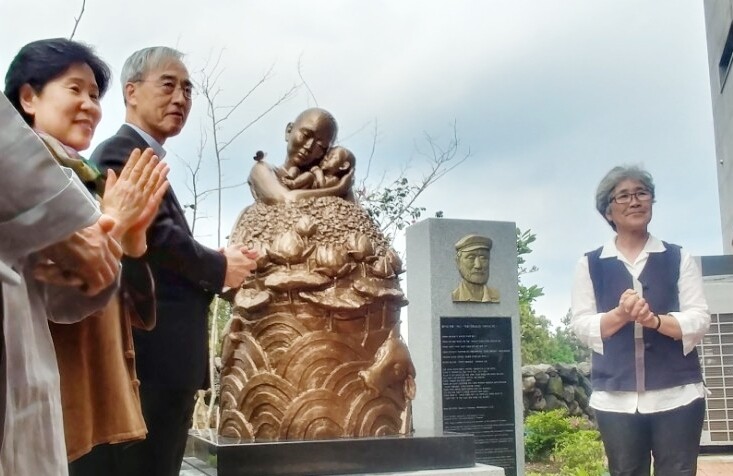hankyoreh
Links to other country sites 다른 나라 사이트 링크
Vietnam pieta: a last lullaby for peace in Vietnam, on Jeju Island

“Remembering my barbarism, remembering / Here / Vietnam’s last lullaby meets Korea’s lullaby / Oh East Asian sound of waves, the sound of my waves and yours” (poet Ko Un)
“Creating a world where the marks of hatred between South Korea and Vietnam disappear / and only love remains / is my task and yours now!” (poet Thanh Thao)
The works of two leading poets, Ko Un from South Korea and Thanh Thao from Vietnam, have been engraved on plates under the title “Vietnam Pieta (Last Lullaby).”
The encounter between Vietnam and Jeju happened in the name of peace. “Vietnam Pieta,” a statue sculpture to appease the souls of mothers and their nameless babies tragically slain in civilian massacres by South Korean forces during the Vietnam War, was raised on Apr. 26 in the village of Gangjeong on Jeju, the “island of peace.”
Apr. 30 marks the 42nd anniversary of the Vietnam War’s end. It’s also ten years to the day since the decision to bid Gangjeong as a candidate site for a naval base on Jeju. The Korea-Vietnam Peace Foundation, chaired by Catholic Bishop of Jeju Peter Kang Woo-il, held an unveiling for the pieta and a 42nd anniversary press conference on the afternoon of Apr. 26 at the St. Francis Peace Center in Gangjeong, the site of a now ten-year-long battle opposing the naval base’s construction.
Just as Vietnam and its people have longed to overcome the war’s legacy and find peace, so there is a hunger for peace in Jeju, which has overcome its own legacy with the April 3 massacre of 1948, and in Gangjeong, a village of life and peace that has rediscovered a new identity in its battle to oppose the naval base. In addition to the Vietnam Pieta, the memorial site that opened on Apr. 26 includes a wall engraved with poems for peace, as well as a relief and the enshrined remains of Father William Jerome “Bix” Bichsel (1928-2015), an American who joined in the Gangjeong peace campaign.
“The Vietnam Pieta embraces all the precious lives lost through war and sings a lullaby of peace. That alone is far from enough as a message of apology from us, but we shall take the Vietnam Pieta as a start,” Bishop Kang said at the press conference.
“Vietnam’s feelings toward Gangjeong are expressed in the words of poet Thanh Thao, who said, ‘Peace means leaving others to live in peace.’ That is the reason that brought the Vietnam Pieta and Gangjeong together,” he added.
Speaking in reference to the ouster of President Park Geun-hye and the raising of the Sewol ferry, Kang went on to say that the “fall of a corrupt government and the raising of the truth immediately thereafter are the present of this land we live in today, the reality of the history we have witnessed.”
Kang also called for an investigation into the Vietnam War-era civilian massacres.
“There must be an investigation of the massacres of civilians by South Korean soldiers during the Vietnam War, which have fallen between the gaps of history without our awareness,” he said. “There must be repentance and apology from all of us for sending our brothers and neighbors into that battleground.”
The Korea-Vietnam Peace Foundation was established in February with the aim of opening up a future for peace and coexistence through South Korea’s reflection as a society on the civilian massacres perpetrated by its troops during the Vietnam War.
By Huh Ho-joon, Jeju correspondent
Please direct questions or comments to [english@hani.co.kr]

Editorial・opinion
![[Column] Park Geun-hye déjà vu in Yoon Suk-yeol [Column] Park Geun-hye déjà vu in Yoon Suk-yeol](https://flexible.img.hani.co.kr/flexible/normal/500/300/imgdb/original/2024/0424/651713945113788.jpg) [Column] Park Geun-hye déjà vu in Yoon Suk-yeol
[Column] Park Geun-hye déjà vu in Yoon Suk-yeol![[Editorial] New weight of N. Korea’s nuclear threats makes dialogue all the more urgent [Editorial] New weight of N. Korea’s nuclear threats makes dialogue all the more urgent](https://flexible.img.hani.co.kr/flexible/normal/500/300/imgdb/original/2024/0424/7317139454662664.jpg) [Editorial] New weight of N. Korea’s nuclear threats makes dialogue all the more urgent
[Editorial] New weight of N. Korea’s nuclear threats makes dialogue all the more urgent- [Guest essay] The real reason Korea’s new right wants to dub Rhee a founding father
- [Column] ‘Choson’: Is it time we start referring to N. Korea in its own terms?
- [Editorial] Japan’s rewriting of history with Korea has gone too far
- [Column] The president’s questionable capacity for dialogue
- [Column] Are chaebol firms just pizza pies for families to divvy up as they please?
- [Column] Has Korea, too, crossed the Rubicon on China?
- [Correspondent’s column] In Japan’s alliance with US, echoes of its past alliances with UK
- [Editorial] Does Yoon think the Korean public is wrong?
Most viewed articles
- 1‘We must say no’: Seoul defense chief on Korean, USFK involvement in hypothetical Taiwan crisis
- 2N. Korean delegation’s trip to Iran shows how Pyongyang is leveraging ties with Moscow
- 3Amnesty notes ‘erosion’ of freedom of expression in Korea in annual human rights report
- 4‘Weddingflation’ breaks the bank for Korean couples-to-be
- 5[Reportage] On US campuses, student risk arrest as they call for divestment from Israel
- 6[Column] Park Geun-hye déjà vu in Yoon Suk-yeol
- 7Korea sees more deaths than births for 52nd consecutive month in February
- 8[Editorial] New weight of N. Korea’s nuclear threats makes dialogue all the more urgent
- 9Will NewJeans end up collateral damage in internal feud at K-pop juggernaut Hybe?
- 10[Guest essay] The real reason Korea’s new right wants to dub Rhee a founding father